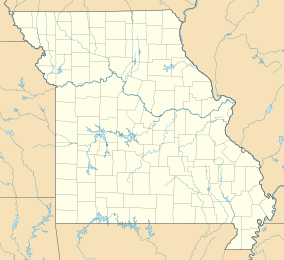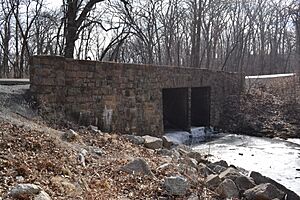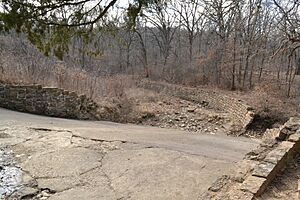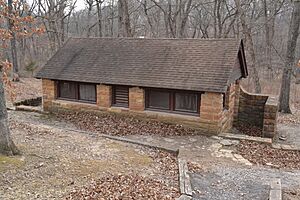Knob Noster State Park facts for kids
Quick facts for kids Knob Noster State Park |
|
|---|---|
| Location | Johnson, Missouri, United States |
| Area | 3,934.38 acres (15.9219 km2) |
| Elevation | 732 ft (223 m) |
| Established | 1935/36 |
| Visitors | 444,544 (in 2017) |
| Governing body | Missouri Department of Natural Resources |
| Website | Knob Noster State Park |
|
Camp Shawnee Historic District
|
|
| Location | SW of Knob Noster, Knob Noster, Missouri |
| Area | 215 acres (87 ha) |
| Built | 1936 |
| Built by | WPA |
| Architectural style | Rustic |
| MPS | ECW Architecture in Missouri State Parks 1933-1942 TR |
| NRHP reference No. | 85000506 |
| Added to NRHP | March 4, 1985 |
|
Montserrat Recreation Demonstration Area Bridge
|
|
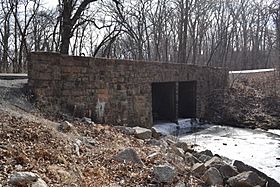 |
|
| Location | MO 132, Knob Noster, Missouri |
| Area | Less than one acre |
| Built | 1937 |
| Built by | WPA; NPS |
| MPS | ECW Architecture in Missouri State Parks 1933-1942 TR |
| NRHP reference No. | 85000507 |
| Added to NRHP | March 4, 1985 |
|
Montserrat Recreation Demonstration Area Entrance Portal
|
|
| Location | Off MO 132, Knob Noster, Missouri |
| Area | Less than one acre |
| Built | 1939 |
| Built by | WPA; NPS |
| MPS | ECW Architecture in Missouri State Parks 1933-1942 TR |
| NRHP reference No. | 85000509 |
| Added to NRHP | March 4, 1985 |
|
Montserrat Recreation Demonstration Area Dam and Spillway
|
|
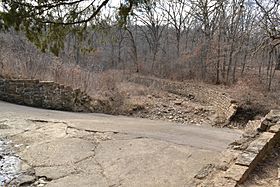 |
|
| Location | SW of Knob Noster, Knob Noster, Missouri |
| Area | Less than one acre |
| Built | 1938 |
| Built by | WPA; NPS |
| MPS | ECW Architecture in Missouri State Parks 1933-1942 TR |
| NRHP reference No. | 85000508 |
| Added to NRHP | March 4, 1985 |
|
Montserrat Recreational Demonstration Area Rock Bath House
|
|
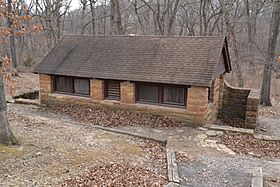 |
|
| Location | SW of Knob Noster, Knob Noster, Missouri |
| Area | Less than one acre |
| Built | 1939 |
| Built by | WPA; NPS |
| MPS | ECW Architecture in Missouri State Parks 1933-1942 TR |
| NRHP reference No. | 85000510 |
| Added to NRHP | March 4, 1985 |
|
Montserrat Recreational Demonstration Area Warehouse #2 and Workshop
|
|
| Location | Off MO 132, Knob Noster, Missouri |
| Area | Less than one acre |
| Built | 1939 |
| Built by | WPA; NPS |
| Architectural style | Rustic |
| MPS | ECW Architecture in Missouri State Parks 1933-1942 TR |
| NRHP reference No. | 85000511 |
| Added to NRHP | March 4, 1985 |
Knob Noster State Park is a fun outdoor area in Johnson County, Missouri. It covers about 3,934 acres, which is like 3,000 football fields! The park is named after the nearby town of Knob Noster.
The word "Knob" means a small hill. "Noster" is a Latin word that means "our." So, "Knob Noster" means "our hill." Long ago, some local Indian people believed these hills were special monuments. The park is a great place for camping, hiking, and fishing all year round. The Missouri Department of Natural Resources takes care of the park.
Contents
Park History: From Farmland to Fun
The park started in the 1930s. It was first called the Montserrat National Recreational Demonstration Area. This was part of a big plan by the National Park Service. They wanted to show how land that had been used for cutting down trees, mining, or farming could be made beautiful again. This restored land could then be used for public fun.
The park was built by two important groups: the Civilian Conservation Corps (CCC) and the Works Progress Administration (WPA). These groups helped people find jobs during a tough time in history. The men of the CCC and WPA built many things in the park. They made roads, bridges, and areas for camping and picnics. They also built important park buildings. In 1946, the park was given to the state of Missouri. That's when it got its current name, Knob Noster State Park.
Historic Sites: Buildings from the Past
Knob Noster State Park has several old buildings and structures. These were built in the 1930s and are now listed on the National Register of Historic Places. They show how people worked to build the park long ago.
- Camp Shawnee Historic District: This area includes 30 buildings. They were built between 1936 and 1941. Workers from the Works Projects Administration built them. These buildings are large and have a rustic, natural style.
- Montserrat Recreational Demonstration Area Warehouse No. 2 and Workshop: These two buildings were made in 1939 and 1940. They were also built by workers from the Works Projects Administration.
- Montserrat Recreational Demonstration Area Rock Bath House: This small stone building was built in 1939. It has a sloped roof and small windows.
- Montserrat Recreation Demonstration Area Entrance Portal: This entrance was built in 1939. It has tall stone walls on both sides of Highway 132.
- Montserrat Recreation Demonstration Area Dam and Spillway: This dam was built in 1938 and 1939. It helped create a small lake for fun activities. It has a concrete dam with stone walls and steps.
- Montserrat Recreation Demonstration Area Bridge: This bridge was built in 1937. It has two flat arches and walls made of stone.
Park Ecology: Prairies and Forests
Knob Noster State Park is a special place where two types of land meet: prairie and forest. In 1861, a soldier described the area as "beautiful prairies, dotted with clumps of trees." This means it was like a savanna, with tall wild grasses and flowers mixed with scattered trees.
Over time, more trees have grown, changing the savanna into a forest. But the park is working to bring back some of the original prairie and savanna. They do this by carefully burning small areas. This helps the native grasses and wildflowers grow again.
Clearfork Creek: A Home for Wildlife
Clearfork Creek flows slowly through the park. It provides water for many trees along its banks. You can find trees like pawpaw, different kinds of hickory and oak, hackberry, and redbud.
The creek, prairie, and woods are home to many animals. You might see great blue herons, pileated woodpeckers, wild turkeys, and white-tailed deer. Other animals include fox, opossum, raccoons, screech owls, and eastern bluebirds.
Pin Oak Slough Natural Area
A small part of the park, about 4 acres, is a special protected natural area called Pin Oak Slough. This area used to be an oxbow slough, which is a U-shaped lake formed when a river changes course.
This area is a wet-mesic forest and shrub swamp. Water often collects here in the spring, forming temporary pools called vernal pools. Trees like pin oak, swamp white oak, and bur oak grow here. You can also find silver maple. A rare flower called the pale green orchid also grows in this special natural area.
Park Geology: Rocks Underfoot
Knob Noster State Park sits on top of old rocks. These rocks are mostly soft shales, but also include sandstones and limestones. They formed millions of years ago during the Mississippian and Pennsylvanian periods.
Some of the common rocks in this area are Mississippian limestone, limestone shale, Ordovician dolomite, and coal. There are also clay and shale layers within the Pennsylvanian bedrock.
Recreation: Fun Things to Do
Knob Noster State Park is open all year for fun activities!
Fishing and Boating
You can go fishing in two lakes, Buteo and Clearfork, and in Clearfork Creek. The most common fish you can catch are channel catfish, crappie, bass, and bluegill. You can use small boats and electric trolling motors on the lakes.
Picnics and Camping
The park has several picnic areas, many right by the lakes. There are also three picnic shelters you can use. If you want to stay longer, Knob Noster State Park offers five different types of camping areas:
- Basic campsites: These have a fire ring and a place to set up your tent.
- Electric campsites: Similar to basic, but with electricity hook-ups.
- Equestrian campsites: These are for people who bring horses.
- Special-use and group camping areas: These are for larger groups or specific needs.


